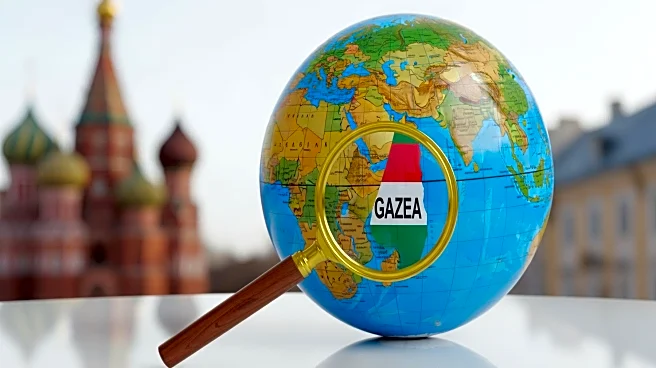What's Happening?
European Union leaders convened in Brussels on October 23, 2025, to address several pressing international issues, with a primary focus on the ongoing conflict between Ukraine and Russia. The summit also highlighted the EU's interest in playing a more
active role in Gaza and the occupied West Bank, following a U.S.-brokered ceasefire between Israel and Hamas. Luxembourg's Prime Minister Luc Frieden emphasized the importance of Europe not just observing but actively participating in the peace process. The EU, a significant aid provider to the Palestinians and Israel's top trading partner, is considering sanctions and a partial trade suspension against Israel to encourage a peace deal in Gaza. Despite the ceasefire, violence continues in Gaza and the West Bank, prompting some EU leaders to advocate for maintaining pressure on Israel.
Why It's Important?
The EU's involvement in Gaza is crucial as it seeks to assert its influence in a region where it has historically been a major aid contributor. The potential sanctions and trade suspensions against Israel could impact diplomatic relations and economic ties between the EU and Israel. The EU's actions may also influence the broader geopolitical landscape, as it attempts to balance its role as a peace broker with its economic interests. The ongoing violence in Gaza and the West Bank poses a challenge to the EU's efforts to stabilize the region, and its decisions could have significant implications for the peace process and regional stability.
What's Next?
The EU is expected to continue its diplomatic efforts to play a more significant role in the Gaza peace process. This includes potential participation in the 'Board of Peace' transitional oversight body and supporting stabilization efforts in Gaza. The EU's decisions on sanctions and trade suspensions will likely be influenced by the evolving situation in Gaza and the West Bank. Additionally, individual EU member states may take independent actions to pressure Israel, as seen with Spain's arms embargo and Slovenia's similar measures. The EU's future actions will be closely watched by international stakeholders, including the U.S. and Middle Eastern countries.
Beyond the Headlines
The EU's involvement in Gaza raises questions about its ability to influence peace processes in regions where it has significant economic and political interests. The ethical implications of imposing sanctions on Israel, a key trading partner, highlight the complex balance between economic interests and human rights advocacy. The EU's actions may also set a precedent for how it engages with other conflicts worldwide, potentially reshaping its foreign policy approach.
















